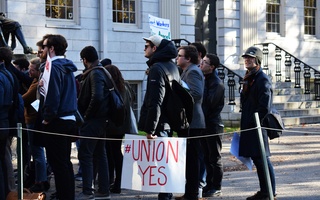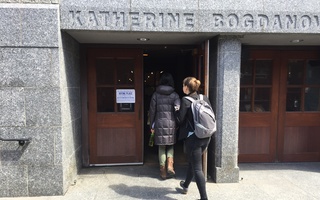A labor attorney representing Harvard’s graduate student unionization effort denounced the University’s appeal of a federal ruling to invalidate a November 2016 unionization election during an event at the Law School on Wednesday.
Over the course of the event, Shelley B. Kroll, one of the unionization effort’s attorneys, criticized the voting list Harvard created before the still-contested 2016 election. In that election, a preliminary count showed more students voting against unionization than in support of it.
Per National Labor Relations Board precedent, employers are required to provide complete and accurate voter lists—called Excelsior lists—to unions before an election. Union organizers and their attorneys have argued for the last year that Harvard excluded potentially eligible voters from the list, skewing the results of the election. Harvard has maintained it provided adequate voter lists.{shortcode-98332261a888273c496484393dbdbda43bf003f8}
The question of the voter list is at the center of a year-long legal dispute between the student unionization effort and Harvard. After a regional NLRB official ruled that Harvard’s voting list had “interfered with the employees’ exercise of a free and reasoned choice” this summer, the University appealed the decision to the NLRB in Washington, D.C., where it remains.
At stake is whether or not eligible undergraduate and graduate students at Harvard can collectively bargain with the University—and whether Harvard will have to host a re-vote. Some labor law experts have said that if the NLRB hears Harvard’s appeal, the board’s Republican majority would likely side with the University.
During the talk, which was hosted by the Law School’s Labor and Employment Action Project, Kroll criticized the University’s legal arguments. In particular, she discussed the precedent set by a 1966 case that requires the Excelsior voting lists.
“So what was really interesting about the Excelsior case was how far-sighted the NLRB was. Almost every argument that Harvard has raised was answered by the Board in 1966,” Kroll said. “They are trying to change the Excelsior rule.”
Harvard lawyers, however, have argued in their appeal that technological breakthroughs like social media have reduced the importance of formal voter lists for informing employees about unionization elections. They have asserted that Excelsior lists were more important in the 1960s, when the NLRB first ruled that voting lists should be mandatory.
“It is important to consider the limited forms of communication available at the time that Excelsior was decided,” lawyers representing the University wrote in a brief filed with the federal NLRB.
University lawyers have also sought to subpoena communications between union organizers and eligible voters. They have argued that the communications could demonstrate the union was able to inform students about the election, despite what Harvard says are minor issues with the voter list.
Kroll, however, criticized this approach, stating that the University’s arguments—if adopted as precedent—could have significant consequences for unions and employees.
“There’s no precedent–none–in all of the years of elections and cases before the Board to allow this to happen,” Kroll said. “It would also, as all of you can understand, deeply chill the exercise of employee rights if they knew that their communications with the union over the course of an election campaign could then be reviewed by their employers.”
This event comes weeks after HGSU-UAW held a rally to urge Harvard to drop its appeal to the federal NLRB.
—Staff writer Caroline S. Engelmayer can be reached at caroline.engelmayer@thecrimson.com. Follow her on Twitter @cengelmayer13.
—Staff writer Phelan Yu can be reached at phelan.yu@thecrimson.com. Follow him on Twitter @phelanyu.
Read more in University News
Climate Change Panel Talks 'Hope and Despair'Recommended Articles
-
In Support of a Fair Unionization ElectionIn ensuring that the wishes of Harvard’s students are carried out, the University must acknowledge the flaws in the original election and remedy them by holding a new, more transparent, one.
-
 Online Petition Garners Support for Student Union Effort
Online Petition Garners Support for Student Union Effort -
 Grad Student Union, Admins Clash Over Voter List for Second Election
Grad Student Union, Admins Clash Over Voter List for Second Election -
 Curran Details Next Steps for New Unionization Election in Email to Students
Curran Details Next Steps for New Unionization Election in Email to Students -
 Harvard Holds Second Unionization Election: Live Updates
Harvard Holds Second Unionization Election: Live Updates













